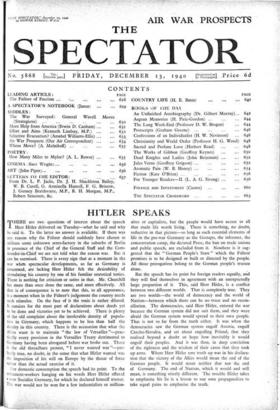HITLER SPEAKS
THERE are two questions of interest about the speech I Herr Hitler delivered on Tuesday—what he said and why he said it. To the latter no answer is available. If there was any reason why the Fiihrer should suddenly have chosen to address some unknown arms-factory in the suburbs of Berlin in presence of the Chief of the General Staff and the Com- mander-in-Chief we are not told what the reason was. But it can be surmised. There is every sign that at a moment in the war when spectacular developments, so far as Germany is concerned, are lacking Herr Hitler felt the desirability of stimulating his country by one of his familiar oratorical tonics. There is nothing for criticism or satire in that. Mr. Churchill has more than once done the same, and more effectively. All that is of consequence is to note that this, to all appearance, is a moment when in the Fiihrer's judgement the country needs such stimulus. On the face of it the tonic is rather diluted. It consists for the most part of declarations about deeds yet to be done and victories yet to be achieved. There is plenty of the old complaint about the intolerable density of popula- tion in Germany, which happens to be less than half the density in this country. There is the accusation that what the Allies want is to maintain "the law of Versailles "—prac- tically every provision in the Versailles Treaty detrimental to Germany having been abrogated before war broke out. There is the old threadbare protest, "I never wanted war "—per- fectly true, no doubt, in the sense that what Hitler wanted was the imposition of his will on Europe by the threat of force rather than the actual exercise of it.
For domestic consumption the, speech had its point. To the arrnament-workers hanging on his words Herr Hitler offered a new Socialist Germany, for which he declared himself trustee. The war would not be won for a few industrialists or million- aires or capitalists, but the people would have access to all that made life worth living. There is something, no doubt, seductive in that picture—so long as such essential elements of life in the pre-war Germany as the Gestapo, the informer, the concentration camp, the dictated Press, the ban on trade unions and public speech, are excluded from it. Nowhere is it sug- gested that the "German People's State" which the Fiihrer promises is to be designed or built or directed by the people. All those prerogatives belong to the German people's trustee alone.
But the speech has its point for foreign readers equally, and they will find themselves in agreement with an unexpectedly large proportion of it. This, said Herr Hitler, is a conflict between two different worlds. That is completely true. They are two worlds—the world of democracy and the world of Nazism—between which there can be no truce and no recon- ciliation. The democracies, said Herr Hitler, entered the war because the German system did not suit them, and they were afraid the German system would spread to their own people. That is not so far from the truth either. It was when the democracies saw the German system engulf Austria, engulf Czecho-Slovakia, and set about engulfing Poland, that they realised beyond a doubt or hope how inevitably it would engulf their peoples. And it was then, in deep conviction of the rightness and the wisdom of their cause that they took up arms. Where Herr Hitler tore truth up was in his declara- tion that the victory of the Allies would mean the end of the German people. It would mean neither that nor the end of Germany. The end of Nazism, which it would and will mean, is something utterly different. The trouble Hitler takes to emphasise his lie is a lesson to our own propagandists to take equal pains to emphasise the truth.










































